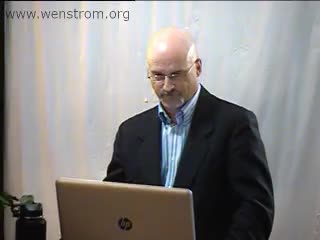First John: 1 John 2:23a-The Person Rejecting the Son Does Not Possess a Relationship with the Father Lesson # 81

First John • Sermon • Submitted • 58:16
0 ratings
· 23 viewsFirst John: 1 John 2:23a-The Person Rejecting the Son Does Not Possess a Relationship with the Father
Files
Notes
Transcript
Sermon Tone Analysis
A
D
F
J
S
Emotion
A
C
T
Language
O
C
E
A
E
Social
No one who denies the Son has the Father. Whoever confesses the Son has the Father also. (ESV)
Pastor-Teacher Bill Wenstrom
Wednesday September 6, 2017
www.wenstrom.org
Lesson # 81
No one who denies the Son has the Father. Whoever confesses the Son has the Father also. (ESV)
“No one who denies the Son has the Father” is composed of the following: (1) nominative neuter singular form of the adjective pas (πᾶς), “no one” (2) articular nominative masculine singular present middle participle form of the verb arneomai (ἀρνέομαι), “who denies” (3) articular accusative masculine singular form of the noun huios (υἱός), “the Son” (4) negative particle oude (οὐδέ), “no one” (5) articular accusative masculine singular form of the noun pater (πατήρ), “the Father” (6) third person singular present active indicative form of the verb echō (ἒχω), “has.”
The adjective pas means “any one, any person” since the word pertains to any one of a totality.
The word pertains to totality with emphasis on its individual components.
Here the word is of any person in the human race who rejects the Son.
As was the case in , the verb arneomai here in means “to reject” since it pertains to refusing to accept something as the truth.
The verb is used here as it was in in relation to the apostolic teaching that Jesus is the Christ and speaks of a person “rejecting” this teaching.
To reject the Son is equivalent to reject Jesus since He is the Son of God.
The present tense of this verb is also a gnomic present which is used in a generic statement to describe something that is true “any time.”
Therefore, it expresses the spiritual principle that any person who “does at any time” reject the Son and thus the apostolic teaching that Jesus of Nazareth is the Christ does not possess a relationship with the Father.
The noun huios is used in relation to Jesus Christ and is employed here as a title for His deity describing the relationship between the Father and Jesus Christ.
The verb echō means “to possess” a relationship with a person and the meaning of this verb is emphatically negated by the negative particle oude, which is used to emphatically advance upon the mention of the rejection of the Son and the previous assertion.
The direct object of this verb is the articular accusative masculine singular form of the noun patēr, which means “Father” referring to the first member of the Trinity.
It emphasizes the familial relationship between Jesus Christ and God.
It also emphasizes this same relationship between God and those who trust in Jesus Christ as their Savior.
Therefore, this verb echō expresses the idea that any person who rejects the Son and thus the apostolic teaching that Jesus is the Christ by no means possesses a personal relationship with the Father.
The present tense of this verb is a gnomic present used to make a statement of a general, timeless fact.
Here it is used to make an absolute statement regarding the relationship between the Father and the person who rejects His Son.
The gnomic present indicates that any person who rejects the Son absolutely does not as an eternal spiritual truth possess a personal, familial relationship with the Father.
Anyone who does at any time reject the Son, unequivocally does not possess a relationship with the Father. The person who does at any time acknowledge the Son, does possess a relationship with the Father also. (My translation)
In , the apostle John posed the rhetorical question: “who is the worst type of liar?”
He answers this by asserting that it is none other than the person who at any time does say, “Jesus is unequivocally not the Christ.”
He then asserts that the person who makes this declaration is the antichrist.
He then presents the consequences of opposing Jesus Christ with such a declaration by asserting that this person is unequivocally rejecting the Father as well as the Son.
This declaration that Jesus is unequivocally not the Christ is equivalent to rejecting the Son since Jesus Himself declared Himself as God’s Son.
This is not only a rejection of the Son but also the Father since the Father sent the Son into the world to become a human being and reconcile sinful humanity to Himself.
It is also rejection of the Father since the Father vindicated His Son by raising Him from the dead which in turn demonstrated that Jesus was in fact His Son (cf. ).
Now, here in , the apostle John makes two more assertions which are connected to these assertions in .
The first teaches that anyone who does at any time reject the Son, unequivocally does not possess a relationship with the Father.
They reject the Son by rejecting the Spirit inspired apostolic teaching that Jesus is the Christ.
This first assertion in verse 23 is teaching that no person can enter into a relationship with the Father accept through faith in His Son Jesus Christ.
It advances upon the assertions in in the sense that John is presenting here in verse 23 another consequence of declaring that Jesus is unequivocally not the Christ and therefore not the Son of God.
In verse 22, John presented the first consequence for making such a declaration, namely that this person is rejecting the Father.
Now, here in verse 23, he presents the second, namely that this person unequivocally does not possess a relationship with the Father.
